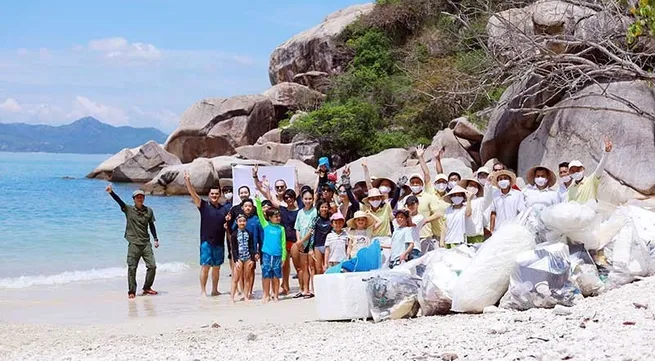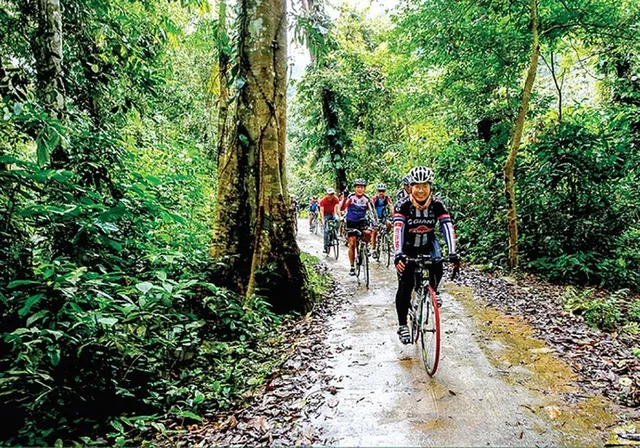Vietnam boosts green transition in tourism sector

A key to sustainable tourism development
Deputy Minister of Culture, Sports and Tourism Hoang Dao Cuong affirmed that green tourism is a new approach to developing Vietnam’s sustainable tourism, as it is identified as a common trend in tourism development in many countries worldwide.
The "green" criterion has become a more attentive option for travellers while sorting out destinations and tourism products.
Developing green tourism not only plays a crucial role in protecting the environment and resources but also brings new values to tourism products and improves economic efficiency.
The Strategy on Vietnam Tourism Development to 2030 has emphasised that Vietnam tourism must be developed with a sustainable and inclusive orientation based on green growth.
In Resolution 82/NQ-CP dated May 18, 2023, on key tasks and solutions to accelerate recovery of tourism and promote sustainable tourism, the Government has assigned the Ministry of Culture, Sports and Tourism to implement the Green Tourism Action Programme for 2023-2025, which stressed the need of protecting the natural and social environment at key tourist destinations.
Several localities in the country have issued their regulations on green tourism development. Green tourism models have also been operated effectively at several destinations and accommodation facilities nationwide.
However, experts pointed out that the development of green tourism in Vietnam still faces many barriers.
According to the Vice President of the Vietnam Travel Association, Phung Quang Thang, one of the challenges is the overload of tourists in some popular destinations, which places pressure on local resources, environment and infrastructure.
In addition, several tourism businesses, notably small and medium-sized enterprises, still face difficulties accessing funding and investment to enhance infrastructure and utilities for green tourism development.
Not to mention, there is a lack of close cooperation and linkage between management agencies, businesses and local communities to implement green tourism activities.
 |
| Tourists cycle in Xuan Son National Park in the northern province of Phu Tho. (Photo: baophutho.vn) |
Creating momentum for green growth
Sharing solutions to boost green transition in the Vietnamese tourism sector, Dr Nguyen Anh Tuan, Director of the Institute for Tourism Development Research under the Vietnam National Authority of Tourism, emphasised the need to perfect mechanisms, policies and regulations on tourism management towards green growth, which should encourage responsibilities among tourism businesses to make sustainable and green investments to create green tourism products and services while promoting green tourism consumption trends.
Tuan added that it is necessary to foster the application of advanced and green technology in tourism activities and encourage using renewable and clean fuel-recycled materials.
Tuan also suggested developing diverse types of green tourism, such as eco-tourism, community-based tourism, agricultural tourism, and nature tourism.
Localities and businesses need to consider the "green" and "sustainability" factors from doing tourism activities, thus making them more environmentally friendly.
It is necessary to foster the application of advanced and green technology in tourism activities and encourage using renewable and clean fuel-recycled materials.
Dr Nguyen Anh Tuan, Director of the Institute for Tourism Development Research
In particular, raising awareness of green tourism development among tourists and those working in the hospitality sector is important. Prompt regulations should be designed to handle individuals and organisations that cause damage to tourism resources and the environment, as well as reward those with practical initiatives and contributions to the development of green and sustainable tourism.
Many experts stressed the need to review Vietnam's green tourism development criteria and issue a set of criteria that can catch up with the current situation. Specific instructions should also be created for localities to develop green tourism criteria.
From the perspective of tourism enterprises, Nhu Thi Ngan, General Director of Hanoi Tourism JSC, affirmed that it is essential to gather the joint participation of state management agencies, local authorities, tourism enterprises, the local community, and tourists to implement the green tourism development orientation successfully.
The State plays a pivotal role in developing green and sustainable tourism by boosting national communication campaigns on green tourism development, changing the green consumption behaviour of tourists, and providing support for tourist businesses through tax incentives and favourable procedures for green loans.
The cooperation from all relevant parties can create a favourable environment for the development of green tourism. Accordingly, the demand for green consumption will lead to green tourism supply and production, green consumption and actions, thereby reinvesting to regenerate resources, preserve the natural and cultural environment, and promote the economy in general, Nhu Thi Ngan explained.
The national green growth plan highlights that tourism has become a highly prioritised group. Thus, the State will undoubtedly allocate resources for development. However, the responsibility also lies with local authorities, who must prioritise and understand green growth to allocate resources and direct optimal budget support for infrastructure investment.
Tags:





